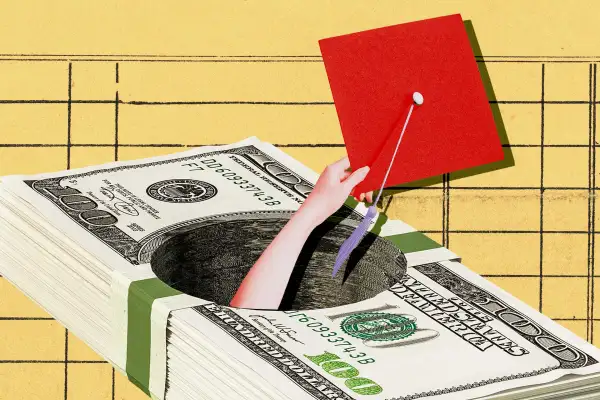Student Loan Delinquencies Are So Bad They're Hurting America's Average Credit Score

Federal student loan borrowers are struggling so much to pay their loan bills that it’s beginning to have an impact on the average credit score for the entire country.
The national average credit score of all U.S. consumers fell to 715 in February, marking a one-point dip from January and a two-point drop from last year, according to a report released Wednesday by the credit scoring firm FICO.
Tommy Lee, senior director of analytics and scores at FICO, said in the report that the decrease is due in part to past-due federal student loan bills, which had been excluded from credit reports for almost five years during and following the pandemic.
“Student loan delinquencies have only just started showing up in the credit report again as of February,” he said. That month alone, 2.7 million federal student loan borrowers had new late payments show up on their credit reports, FICO data shows, and many more are likely to follow in the coming months.
While a one-point drop in the nation’s average credit score may sound small, it belies a major crisis for student loan borrowers. Overall, the country's average FICO score rarely drops. This decline is only one of two times that the average FICO score has fallen in the past decade.
FICO scores are relied on by most U.S. lenders to determine a loan's terms — or whether to provide the loan or financial service altogether. Scores range from 300 to 850. A credit score of 670 to 739 is considered "good," and anything above that is "very good" or "excellent," indicating that a borrower is responsible. Scores below 670 are considered “fair” or “poor,” and typically result in higher interest rates or restricted access to credit.
Why millions of student loan borrowers are suddenly delinquent
Millions of student loan borrowers who are behind on their payments are just now beginning to see their credit scores plummet as a result — even though many of them may not have made any payments since March 2020.
In the early days of the pandemic, President Donald Trump paused federal student loan payments during his first term. Then, former President Joe Biden extended the pause several more times until October 2023.
To help borrowers reacclimate to making payments after years without them, the Education Department under Biden implemented a year-long “on-ramp” period, in which it did not report delinquent payments to the credit bureaus. The on-ramp expired at the end of September 2024, and loans due the following month would restart the delinquency clock.
For a federal loan to fall into delinquency, the payment must be at least 90 days late, which is why the credit ramifications of missed payments are now evident in 2025.
In the coming months, FICO estimates upwards of 5.4 million more borrowers are at risk of falling into 90-day delinquency on their student loans. “These additional delinquencies could lead to further declines in the average FICO Score over the next few months,” Lee said.
More than 40 million Americans hold federal student loan debt, which now exceeds $1.6 trillion.
How a delinquent student loan can tank your credit
For years, advocates and researchers have been warning of this financial cliff for struggling student loan borrowers.
From March 2020 to October 2024, the period in which loan payments were paused plus the “on-ramp,” inflation soared over 22%.
The financial breathing room that pandemic-era student loan policies initially provided was quickly eaten up by higher prices for rent, groceries and everything else. For many borrowers, “that money just isn’t there anymore,” advocate Betsy Mayotte told Money in 2023.
A report last month from the New York Federal Reserve Bank similarly predicted a massive wave of delinquencies. NY Fed researchers estimated that more than 9 million student loan borrowers face “substantial declines” in their credit scores as a result of late payments.
While the national average credit score has thus far fallen only one point, the score of an individual student loan borrower can crater from delinquency. The higher the borrower's score to start, the harder the delinquency hits.
For borrowers with poor credit scores — 620 and below — a delinquent student loan caused an estimated 87-point decline, NY Fed research shows. For those with initial credit scores of 760 or higher, a delinquency can drop their score by 171 points.
“Although some of these borrowers may be able to cure their delinquencies,” the Fed researchers wrote, “the damage to their credit standing will have already been done and will remain on their credit reports for seven years.”
More from Money:
Best Private Student Loans of April 2025
Here's How 4 Borrowers Paid Off Their Student Loans Early
Trump Plans to Move Student Loan Portfolio to SBA. Here's What Borrowers Need to Know






